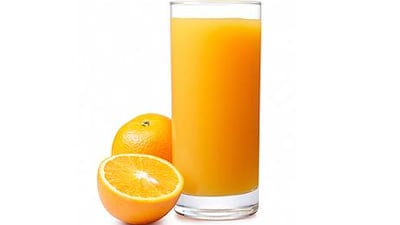A daily glass of orange juice could increase the risk of cancer, new scientific research has found.
A study of 100,000 French adults published in the British Medical Journal, reveals those consuming just 10g of sugar a day in drinks were 18 per cent more likely to get cancer.
Women are particularly at risk, with the chances of breast cancer rising by 22 per cent.
Scientists behind the data at the epidemiology and statistics research centre at the Sorbonne Paris Cité urged caution on how their results should be interpreted, but warned against drinking sugary drinks every day.
The findings indicate that a small glass of fruit juice - viewed by many as a healthier alternative to energy drinks and soft drinks - could increase cancer risks as much as consuming a third of a can of cola or Red Bull.
The study looked at any beverage containing more than 5 per cent sugar, including carbonated soft drinks and pure fruit juices.
The researchers found every 100ml of sugary drink consumed was associated with an 18 per cent risk of a cancer diagnosis.
Those taking part in the study had an average age of 42, and kept a three day diet diary every two years.
Completed questionnaires were monitored for each individual for an average of five years.
In that period, almost 2,200 cases of cancer were diagnosed in those subjects, about 22 per 1,000 people.
Researchers said additives and chemicals added to some drinks may also contribute to the increase in reported cancer cases.
Experts said increase intake of sugary drinks may indicate an overall poor diet, that could also be raising the risk of obesity and related health conditions.
A recent Cancer Research UK study claimed excess weight is now a bigger cause of bowel, kidney, ovarian and liver cancer than tobacco.
Doctors in the UAE said dietary education at a young age is crucial to help reverse the slide towards a cancer epidemic.
“In order to reduce the prevalence of overweight and obese patients in the UAE, we seriously need to think about implementing multidisciplinary national programs to raise awareness of the very serious health condition,” said Dr Hussam Al Trabulsi, a bariatric surgeon at Medcare Hosptial, Al Safa.
“This could be through health education awareness, access to sports, access to healthier foods, encourage daily exercise and overall holistic patient awareness programs.
“Moreover, this information needs to be instilled in children at a young age as they are at most risk.”
In 2017, the UAE introduced a ‘sin tax’ on sugary soft drinks with a 50 per cent increase in excise duty.
Regulators stepped in to try to halt the nation’s spiralling obesity crisis and plummeting dental care.


